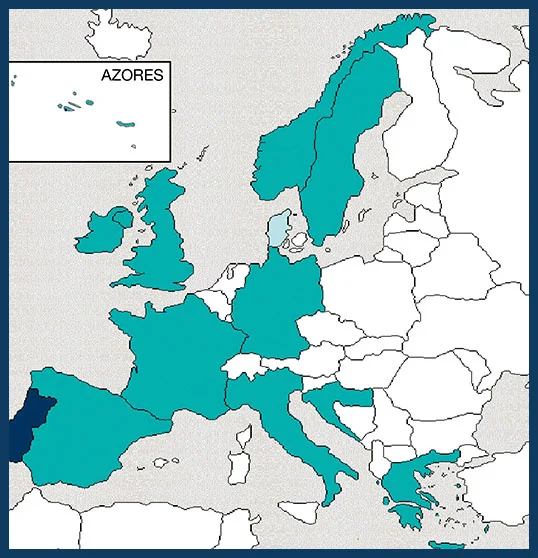01-2017 to 12-2019
€ 1,618,359
Prof. Ester Serrao
eserrao@ualg.pt
Centre of Marine Sciences at the University of Algarve, Faro, PORTUGAL (Coordinator)
Aarhus University, Silkeborg, DENMARK
Aix-Marseille University, Marseille, FRANCE
CNRS UPMC Station Biologique de Roscoff, Roscoff, FRANCE
AWI – Alfred-Wegener Institute, Bremerhaven, GERMANY
University of Cologne, Cologne, GERMANY
University of Bologna, Bologna, ITALY
University of Azores, Horta, PORTUGAL
University of Malaga, Malaga, SPAIN
University of Goteborg, Strömstad, SWEDEN

Marine forests support major ecosystem functions along the coastlines of Europe. These ecosystems, structurally formed by large brown algae such as kelp and fucoids, have undergone major range shifts that left imprints in contrasting population traits along each species range. Their expected restricted connectivity causes climate-driven range shifts to create homogeneous lower diversity along expansion zones, leaving behind in ancient presently warmer stable ranges unique diversity and traits that are increasingly threatened. Changes in marine forest ranges and adaptive traits can affect stakeholders in many ways, from the loss of entire forests and services, to the loss of adaptive traits and of blue growth potential linked with genetic resources, aquaculture and other seaweed-derived industries.
The MARFOR project aims to understand past and predict future consequences of global change for biodiversity of marine forests below species level, by the geographical distribution of functional traits, genetic biodiversity and connectivity, and their consequences for stakeholders linked to blue-green ecosystem infrastructures formed by marine forests along European coastlines.
Specifically, the project goals are:
1. Quantification of the variability in functional genetic diversity and differentiation of seaweed populations along environmental gradients across European coast- lines.
2.Discovery of ecological, ecophysiological and functional genomic differences between populations and species with contrasting biogeographic affinities, population structure and microevolutionary history.
3.Prediction of changes in marine forest diversity and function under possible future climate scenarios. 4) Identification of critical features of marine forests along European rocky shorelines and their implications for stakeholders.
The MARFOR project will study the functional consequences of the ongoing and predicted spatial shifts in intra-specific biodiversity from genomic to ecological and evolutionary responses of marine forest species. These results will be used to develop models to predict the consequences of these changes for the future of European marine forest ecosystems and will outline the implications and re- commendations for practical applications of biodiversity for blue growth (e.g., kelp aquaculture industries) and for coastal green infrastructures and management measures (e.g., for ecosystem restoration practices).
The MARFOR project is organizing several workshops with stakeholders from the industry to conservation and management to provide them with solid data-driven scientific basis for habitat conservation and sustainability management, and for the blue growth economic activities that depend on marine forest species. A large- scale citizen science initiative will contribute to assess the status of marine forests, while promoting European wide awareness about marine forests.